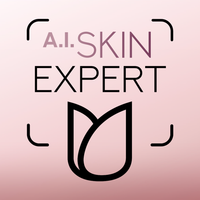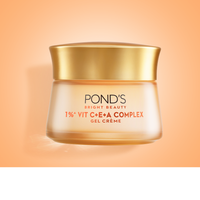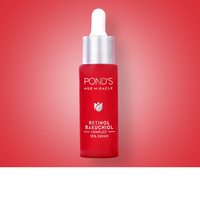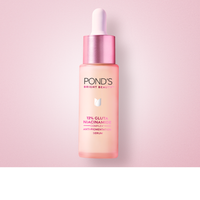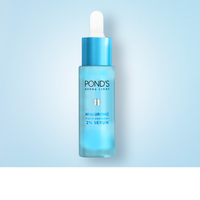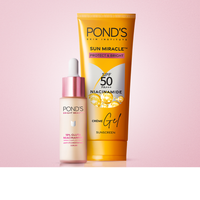Filter
Price
Product Type
POND’S Sun Miracle SPF 50 PA+++ Crème Gel Sunscreen - Protect & Bright, With Niacinamide
POND’S Sun Miracle SPF 55 PA+++ Light Sunscreen - Protect & Bright
POND’S Sun Miracle SPF 35 PA+++ Light Sunscreen - Protect & Bright, With Niacinamide 50g
POND’S Sun Miracle SPF 50 PA++ Sunscreen Serum - Protect & Bright, With Niacinamide 14ml
Faqs
1. What are the benefits of sun care products?
Sun care products offer numerous benefits, such as protection against harmful UV radiation, prevention of sunburns, reduced risk of skin cancer, and prevention of premature ageing, wrinkles, and age spots. It also helps maintain the skin's health and glow.
2. Can I use after-suncare products daily?
After-suncare products, such as moisturisers and soothing creams, are designed to provide relief and hydration after sun exposure. While they can be used daily for moisturising purposes, it's important to note that they are not substitutes for sunscreen. You can use the soothing POND'S Super Light Gel as your skin heals, but you still need to use the POND'S Serum Boost Sunscreen as the former doesn't provide sufficient protection against UV radiation.
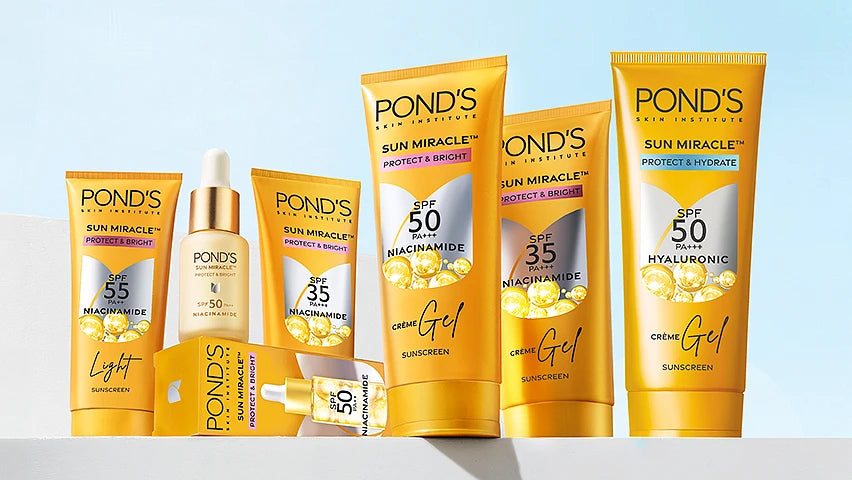
More about Pond’s Sun Miracle
Gone are the days when you had to struggle with sweaty skin in humid conditions. All you need is a body talc. While these talcum powders control sweat, they also help in reducing body odour. Just dust a small amount of POND'S Body Talc all over your body after your shower and stay sweat-free throughout the day. Let's understand more about body talcs, how to choose the right one for your skin, and how to use them.
India is a country, where warm and sunny days are the norm for a significant part of the year. The scorching sun can pose significant risks to our skin, making sun care an essential aspect of our daily skincare routine. Not just during summers, but sun protection is equally important in monsoons and winters as well. Moreover, contrary to popular belief, having more melanin does not provide complete protection against UV damage. Thus, sun care is essential for individuals of all skin types and tones in India.
Sun care involves taking preventive measures and using appropriate products to shield our skin from the damaging effects of UV radiation. Understanding the risks associated with UV radiation is crucial for taking appropriate sun protection measures. While UVC radiation does not reach the Earth, UVA rays and UVB rays can penetrate the skin, leading to various damaging skin concerns. By educating ourselves about these risks and embracing sun care practices, we can minimise potential harm to our skin.
In this extensive guide to sun care, we will try to understand how sun exposure works, explore the risks associated with unprotected sun exposure, discuss how to choose the right sun care products to create an effective sun care routine, address sun care concerns for different skin types, and provide special tips for children and infants.
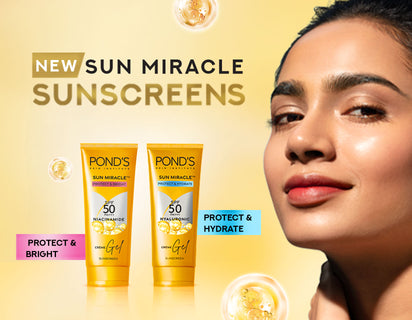
If you want to understand the true value of sun care, it's essential to understand the types of UV rays emitted by the sun and how they affect our skin. The sun emits three types of UV radiation - UVA rays, UVB rays and UVC rays. Out of these, UVC rays are the shortest and most dangerous type of ultraviolet radiation. However, fortunately, they do not reach the Earth's surface, and hence, do not pose a significant risk to our skin.
On the other hand, UVA rays can cause long-term damage such as premature ageing, wrinkles, and the appearance of dark spots or hyperpigmentation. Meanwhile, UVB rays can lead to painful sunburns and increase the risk of developing skin cancer, including melanoma, which is a rapidly growing concern in India.
Many people, especially those in Western countries, believe that a tan is a sign of healthy skin. However, that's not true at all. In fact, tanning is an indication of skin damage. While many may think that sunburn is merely a temporary inconvenience, in reality, it is a warning sign of potential long-term damage, making effective sun care that much more important.
If you want to understand the true value of sun care, it's essential to understand the types of UV rays emitted by the sun and how they affect our skin. The sun emits three types of UV radiation - UVA rays, UVB rays and UVC rays. Out of these, UVC rays are the shortest and most dangerous type of ultraviolet radiation. However, fortunately, they do not reach the Earth's surface, and hence, do not pose a significant risk to our skin.
On the other hand, UVA rays can cause long-term damage such as premature ageing, wrinkles, and the appearance of dark spots or hyperpigmentation. Meanwhile, UVB rays can lead to painful sunburns and increase the risk of developing skin cancer, including melanoma, which is a rapidly growing concern in India.
Many people, especially those in Western countries, believe that a tan is a sign of healthy skin. However, that's not true at all. In fact, tanning is an indication of skin damage. While many may think that sunburn is merely a temporary inconvenience, in reality, it is a warning sign of potential long-term damage, making effective sun care that much more important.
Understanding Sun Exposure
Risks of Unprotected Sun Exposure
Unprotected sun exposure can have severe and long-lasting consequences on our skin. Prolonged exposure to UV radiation can not only lead to sunburns, premature ageing, and pigmentation, but it also increases your risk of skin cancer. Among these, premature ageing, wrinkles, dark spots, and pigmentation caused by UVA rays result in long-term damage to the skin. Meanwhile, UVB rays can cause sunburn and can even lead to skin cancer.
Statistically speaking, skin cancer is the most common type of cancer globally. One in every three cancers diagnosed is a Skin Cancer. According to the World Health Organization, between 2 and 3 million non-melanoma skin cancers and 132,000 melanoma skin cancers are diagnosed globally each year.
Moreover, sun exposure also accelerates the ageing process of your skin, resulting in the formation of wrinkles, fine lines, and age spots. This is a long-term consequence of excessive sun exposure which can be avoided by using proper sun care and anti-ageing products that not only provide sun protection but also help you slow down the ageing process.
Unprotected sun exposure can have severe and long-lasting consequences on our skin. Prolonged exposure to UV radiation can not only lead to sunburns, premature ageing, and pigmentation, but it also increases your risk of skin cancer. Among these, premature ageing, wrinkles, dark spots, and pigmentation caused by UVA rays result in long-term damage to the skin. Meanwhile, UVB rays can cause sunburn and can even lead to skin cancer.
Statistically speaking, skin cancer is the most common type of cancer globally. One in every three cancers diagnosed is a Skin Cancer. According to the World Health Organization, between 2 and 3 million non-melanoma skin cancers and 132,000 melanoma skin cancers are diagnosed globally each year.
Moreover, sun exposure also accelerates the ageing process of your skin, resulting in the formation of wrinkles, fine lines, and age spots. This is a long-term consequence of excessive sun exposure which can be avoided by using proper sun care and anti-ageing products that not only provide sun protection but also help you slow down the ageing process.
Selecting the appropriate sun care products is crucial for effective sun protection. One of the most important factors to consider while buying sunscreen is the Sun Protection Factor (SPF), which indicates the level of protection a product offers against UVB rays. Meanwhile, the PA rating indicates the level of protection you get from UVA rays. Ideally, it's recommended to use a broad-spectrum sunscreen with SPF30 or higher and a PA++ rating or more. The word broad-spectrum here indicates that the sunscreen provides protection against both UVA and UVB rays.
Alongside traditional sunscreen creams, there are a variety of options available in the market, such as sunscreen gels, de-tan face washes, and sunscreen serums, with each product having its own unique advantages. POND'S Serum Boost Sunscreen Cream with SPF 55 and PA++ provide broad coverage and hydration, while the POND'S Serum Boost Sunscreen Gel with SPF 50 and PA+++ is suitable for individuals with oily skin as it is lightweight and non-greasy. The sunscreen cream also comes in an SPF 35 and PA+++ variant, which is a budget-friendly version of the sunscreen providing adequate sun protection.
The sun care range offered by POND'S also offers POND'S DeTan Facewash with Vitamin C Niacinamide which aids in reducing pigmentation caused by sun exposure with every wash. Meanwhile, POND'S Serum Boost Sunscreen Serum with SPF 50 and PA++ offers sun protection while being a lightweight option for daily use.
Selecting the appropriate sun care products is crucial for effective sun protection. One of the most important factors to consider while buying sunscreen is the Sun Protection Factor (SPF), which indicates the level of protection a product offers against UVB rays. Meanwhile, the PA rating indicates the level of protection you get from UVA rays. Ideally, it's recommended to use a broad-spectrum sunscreen with SPF30 or higher and a PA++ rating or more. The word broad-spectrum here indicates that the sunscreen provides protection against both UVA and UVB rays.
Alongside traditional sunscreen creams, there are a variety of options available in the market, such as sunscreen gels, de-tan face washes, and sunscreen serums, with each product having its own unique advantages. POND'S Serum Boost Sunscreen Cream with SPF 55 and PA++ provide broad coverage and hydration, while the POND'S Serum Boost Sunscreen Gel with SPF 50 and PA+++ is suitable for individuals with oily skin as it is lightweight and non-greasy. The sunscreen cream also comes in an SPF 35 and PA+++ variant, which is a budget-friendly version of the sunscreen providing adequate sun protection.
The sun care range offered by POND'S also offers POND'S DeTan Facewash with Vitamin C Niacinamide which aids in reducing pigmentation caused by sun exposure with every wash. Meanwhile, POND'S Serum Boost Sunscreen Serum with SPF 50 and PA++ offers sun protection while being a lightweight option for daily use.
Choosing the Right Sun Care Products
Sun Care for Different Skin Types
Every individual has unique skin characteristics, and tailoring sun care to suit specific skin types is essential. People with oily, combination or sensitive skin can opt for oil-free or gel-based sunscreens such as the POND'S Serum Boost Sunscreen Gel as it does not clog pores or contribute to excess oiliness. Meanwhile, those with dry skin can use POND'S Serum Boost Sunscreen Cream which provides hydration and prevent skin dryness. You can also use the POND'S Serum Boost Sunscreen Serum to get an added layer of protection. Customising your sun care routine to suit different skin types ensures that individuals can enjoy effective sun protection without compromising their skin's specific needs and concerns.
Every individual has unique skin characteristics, and tailoring sun care to suit specific skin types is essential. People with oily, combination or sensitive skin can opt for oil-free or gel-based sunscreens such as the POND'S Serum Boost Sunscreen Gel as it does not clog pores or contribute to excess oiliness. Meanwhile, those with dry skin can use POND'S Serum Boost Sunscreen Cream which provides hydration and prevent skin dryness. You can also use the POND'S Serum Boost Sunscreen Serum to get an added layer of protection. Customising your sun care routine to suit different skin types ensures that individuals can enjoy effective sun protection without compromising their skin's specific needs and concerns.
Children and infants have delicate skin that requires extra protection from the sun's harmful rays. For optimum sun protection, keep your babies under six months of age out of direct sunlight, and apply and re-apply a broad-spectrum sunscreen with a high SPF to your older kids when going out. Dress them in protective clothing, provide wide-brimmed hats, and offer sunglasses to safeguard their skin and eyes from UV radiation.
In conclusion, prioritising sun care and protecting our skin from the damaging effects of UV radiation is essential for maintaining healthy and radiant skin. By understanding the risks of sun exposure, and adding the right products to your sun care routine you can enjoy the sun responsibly and minimise potential harm.
Children and infants have delicate skin that requires extra protection from the sun's harmful rays. For optimum sun protection, keep your babies under six months of age out of direct sunlight, and apply and re-apply a broad-spectrum sunscreen with a high SPF to your older kids when going out. Dress them in protective clothing, provide wide-brimmed hats, and offer sunglasses to safeguard their skin and eyes from UV radiation.
In conclusion, prioritising sun care and protecting our skin from the damaging effects of UV radiation is essential for maintaining healthy and radiant skin. By understanding the risks of sun exposure, and adding the right products to your sun care routine you can enjoy the sun responsibly and minimise potential harm.

